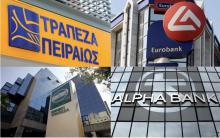European Central Bank
Banks exceed expectations
The "big four" Greek banks - Alpha, Eurobank, National and Piraeus - posted impressive first-half results, analysts say, focusing on their strong profitability and its main underlying cause, interest and commission fees, but also the quality of their assets and their liquidity, which led all to adjust their end-year goals upward.
- Read more about Banks exceed expectations
- Log in to post comments
ECB trims Greek bond holdings by €172 mln
The European Central Bank reduced its Greek bond holdings by €172 million in June and July, to €37.979 billion, €1.82 billion from its spring 2022 high of €39.8 billion.
The ECB had purchased these bonds as part of its Pandemic Emergency Purchase Program (PEPP) despite the fact that Greek debt was, and still is not, investment grade.
- Read more about ECB trims Greek bond holdings by €172 mln
- Log in to post comments
Investment grade bestowed
The decision late on Friday by German credit rating agency Scope Ratings to upgrade Greek debt to BBB-, that is, investment grade, comes on the heels of a similar decision by Japanese firm R&I and provides hopes that the "big four" ratings firms recognized by the European Central Bank - Fitch, Moody's, Standard & Poor's and DBRS - will move in the same direction, bestowing an investment
- Read more about Investment grade bestowed
- Log in to post comments
Bond yields reaching EU average
Greek bond yields have fallen fast and currently the 2- and 10-year-bonds are trading at around the European average, 3.31% and 3.8% respectively.
Since the European Central Bank (ECB) started raising its rates to fight inflation, Greek borrowing costs have dropped by almost 10%, even as other eurozone members have seen their own inching upward.
- Read more about Bond yields reaching EU average
- Log in to post comments
National Bank of Greece reports strong return on equity
National Bank of Greece announced a first-half profit after tax of €530 million Tuesday, slightly lower than the €546 million posted in the first half of 2022.
Core profit after tax stood at €508 million for the half, of which €288 million was in the second quarter, with return on tangible equity exceeding 16%, the bank said.
The Rise in Core Inflation in the Eurozone remains Sustainable
Lending in Bulgaria remains high against the backdrop of another increase in interest rates by the ECB. The goal of the central bank is to reduce inflation to 2%, but the forecasts are that it will remain high for a long period of time, commented President Christine Lagarde.
First investment grade decision
Japan gave an important vote of confidence to Athens, as its rating agency Rating and Investment Information (R&I) is now the first to attribute Greece investment grade, after the upgrade to BBB- with stable prospects (from BB+ with stable prospects previously) on Monday.
- Read more about First investment grade decision
- Log in to post comments
ECB ‘could hike rates or pause at next meeting’
The European Central Bank (ECB) could hike interest rates again or pause at its next meeting and any decision will depend on the latest data, president Christine Lagarde has said.
The central bank for the 20 countries that use the euro lifted borrowing costs for the ninth consecutive time on July 28 as it fights stubbornly high inflation.
- Read more about ECB ‘could hike rates or pause at next meeting’
- Log in to post comments
Stournaras: Interest rate rises look set to end soon
Two European Central Bank policymakers on Friday raised the prospect of an end to the ECB's steepest and longest string of interest rate rises, as the outlook for the eurozone economy worsened despite stubbornly high inflation.
The ECB increased borrowing costs for a ninth consecutive time on Thursday but raised the possibility of a pause in September as recession worries mount.
ATHEX: Index fails to surmount 1,350-pt mark
The vast majority of Greek stocks ended Thursday's trading session with gains, but some non-bank blue chips held the benchmark back from hitting a new nine-year high and the 1,350-point level, which remains elusive for now. The positive messages from the US Fed and the European Central Bank create a favorable climate for further price growth in the coming days, analysts note.
- Read more about ATHEX: Index fails to surmount 1,350-pt mark
- Log in to post comments










